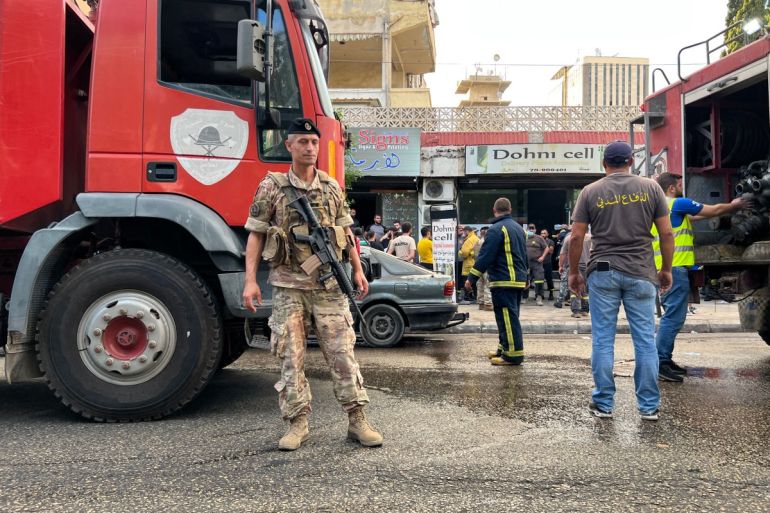Iran warns Israel of ‘crushing response’ after attacks on Hezbollah
Iran’s Revolutionary Guard commander promises ‘destruction’ of Israel after communication device blasts.
A Lebanese soldier stands guard near fire trucks at the scene of a reported pager explosion in Saida in southern Lebanon on September 18, 2024 [Mahmoud Zayyat/AFP]Published On 19 Sep 202419 Sep 2024
Israel will face “a crushing response from the axis of resistance”, the commander of Iran’s Islamic Revolutionary Guard Corps, Hossein Salami, has told Hezbollah leader Hassan Nasrallah, according to state media.
Salami made the statement on Thursday after unprecedented attacks in the previous two days on Hezbollah pagers and walkie-talkies, which killed 37 people and wounded more than 2,900 when hundreds of devices were detonated almost simultaneously.
The “axis of resistance” refers to Iran-aligned armed groups in the Middle East, including Lebanon’s Hezbollah, Yemen’s Houthis and Iraq’s Popular Mobilisation Forces.
Lebanon and Hezbollah have blamed Israel for the attacks on Tuesday and Wednesday. Israel has not directly commented on the blasts, but security sources said they were probably carried out by its Mossad spy agency.
“Such terrorist acts are undoubtedly the result of the Zionist regime’s [Israel’s] despair and successive failures. This will soon be met with a crushing response from the axis of resistance, and we will witness the destruction of this bloodthirsty and criminal regime,” Salami said in his message to Nasrallah.
Fears of a regional conflagration reignite
Iran and Israel frequently exchange threats of mutual destruction. Their hostilities peaked in April when Iran launched drones and missiles in its first direct attack against Israel in response to a deadly Israeli strike on its embassy in Syria, which killed 13 people.
Tensions ratcheted up again in July when, within hours of one another, Israel killed Hezbollah commander Fuad Shukr in Beirut and Hamas’s political leader Ismail Haniyeh was killed in Tehran after attending President Masoud Pezeshkian’s inauguration.
Many expected those killings might trigger a wider regional war, but so far, no major response has been forthcoming.
In a speech on Thursday, his first since this week’s attacks in Lebanon, Nasrallah said the blasts targeting Hezbollah members are “a declaration of war”, and he promised retaliation without giving a timeline for a response.
Nasrallah conceded Hezbollah had suffered a “major and unprecedented” blow. But he also struck a defiant tone, saying Israel would face a “just punishment”.
As he delivered his televised address, Israeli warplanes broke the sound barrier over Beirut.
Israel’s defence minister, Yoav Gallant, said after the speech that Hezbollah “will pay an increasing price” as Israel seeks to return residents to its northern areas, which were evacuated as a result of tit-for-tat attacks with Hezbollah across the border with Lebanon that began after Israel launched its war on Gaza on October 7.
The exchanges of fire have forced tens of thousands of people on both sides of the border to flee their homes.
On Thursday, the Israeli military said it struck six Hezbollah “infrastructure sites” and a weapons storage facility overnight in southern Lebanon, a stronghold of the group.
Lebanon’s official National News Agency also reported Israeli strikes and shelling on several towns in the south.
The Israeli military said two of its soldiers were killed near the border with Lebanon.
On Sunday, Yemen’s Houthis launched what they said was a hypersonic missile at central Israel, causing fires, triggering air raid sirens and sending residents running for shelter in the area around Ben Gurion Airport.
The Houthis have been attacking ships they see as linked to Israel – in the Red Sea, the Gulf of Aden and the Bab al-Mandeb Strait – since November, proclaimed solidarity with Palestinians and against Israel’s continuing war on Gaza.
